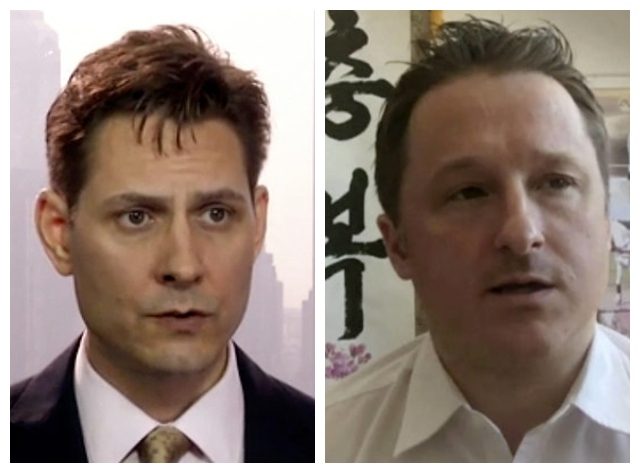China formally accused – but did not yet formally charge – Canadians Michael Spavor and Michael Kovrig of espionage on Monday. The two were arrested soon after Canada detained Huawei executive and Communist royalty Meng Wanzhou for possible extradition to the United States. The accusation of espionage was made three days after Canada announced Meng’s extradition hearing would proceed.
Kovrig and Spavor were arrested in December without official explanation, although China’s state-run media hinted they were suspected of espionage and even more strongly hinted that Canada needed to release Meng to win any sort of leniency for its captive citizens.
Kovrig and Spavor have been held without access to legal counsel or communication with their family members, while Meng was granted bail and allowed to relax at one of her luxurious homes in Canada as the American extradition request is processed.
China still has not initiated anything resembling a civilized legal proceeding against either Kovrig or Spavor, but on Monday morning, Reuters noticed a post on the “microblog” of the Communist Party’s Central Political and Legal Affairs Commission that accused Kovrig of “stealing and spying on sensitive Chinese information and intelligence via a contact in China.”
“Spavor was Kovrig’s main contact and provided him with intelligence,” the blog post added, without offering any evidence for these assertions.
“China is a country with rule of law and will firmly crack down on criminal acts that severely undermine national security,” the Party commission vowed.
China’s state-run Xinhua news agency reported on Monday that Kovrig stands accused of “severely violating” Chinese law by stealing state secrets during the past two years with the assistance of Spavor.
The Xinhua report did not give any other details of the allegations or provide a timetable for when judicial proceedings might begin.
Kovrig is a senior adviser for an organization called the International Crisis Group (ICG), which challenges the legality of his detention and has demanded his release since he was taken into custody 84 days ago:
A former Canadian diplomat who works full-time for us, Michael has not been allowed to see a lawyer or anyone in his family. He only has periodic consular visits. We are deeply concerned for his health and well-being in detention.
Michael has not been charged with any offense. We do not understand the unspecified allegations that he has “endangered Chinese security”. Michael’s work has included meeting several dozen times over the past two years with Chinese officials, academics and analysts from multiple Chinese state institutions. He has attended numerous conferences at the invitation of Chinese organizations. He frequently appears on Chinese television and in other media to comment on regional issues.
“We are aware of the Xinhua report of March 4 but have heard nothing official about any charges being laid against our colleague, Michael Kovrig,” ICG spokesman Karim Lebhour said on Monday.
“Michael’s work for Crisis Group has been entirely transparent and in the open as all who follow his work can attest. Vague and unsubstantiated accusations against him are unwarranted and unfair,” Lebhour added.
Former Canadian ambassador to China David Mulroney told the New York Times on Monday that China often uses allegations of “stealing state secrets” as a “catchall” charge against anyone the government wishes to persecute.
“They can determine that anything is improper. A conversation you had which was O.K. yesterday, is a state secret today,” said Mulroney.
China’s Foreign Ministry chose to repeat its call for Meng’s release on Monday, adding a belligerent note that Canada needs to watch its step when dealing with Chinese citizens.
“We urge Canada to immediately release Ms Meng Wanzhou, let her return to China in safety while ensuring her legitimate and justifiable rights and interests, and not repeat its mistakes,” Foreign Ministry spokesman Lu Kang said.
“I’m sure it’s very clear to you that, compared to how other countries in the world handle cases involving national security, China’s ways are no different,” Lu told reporters, despite the fact that literally everything about the way China is handling the Kovrig and Spavor cases falls short of international standards for justice and human rights.
Meng Wanzhou filed a civil suit against the Canadian government on Friday, alleging police and border security agents committed “serious breaches” of her civil rights when they arrested her at the Vancouver airport on December 1. The suit claims she was detained, searched, and questioned under false pretenses and was not properly informed of her legal rights.

COMMENTS
Please let us know if you're having issues with commenting.